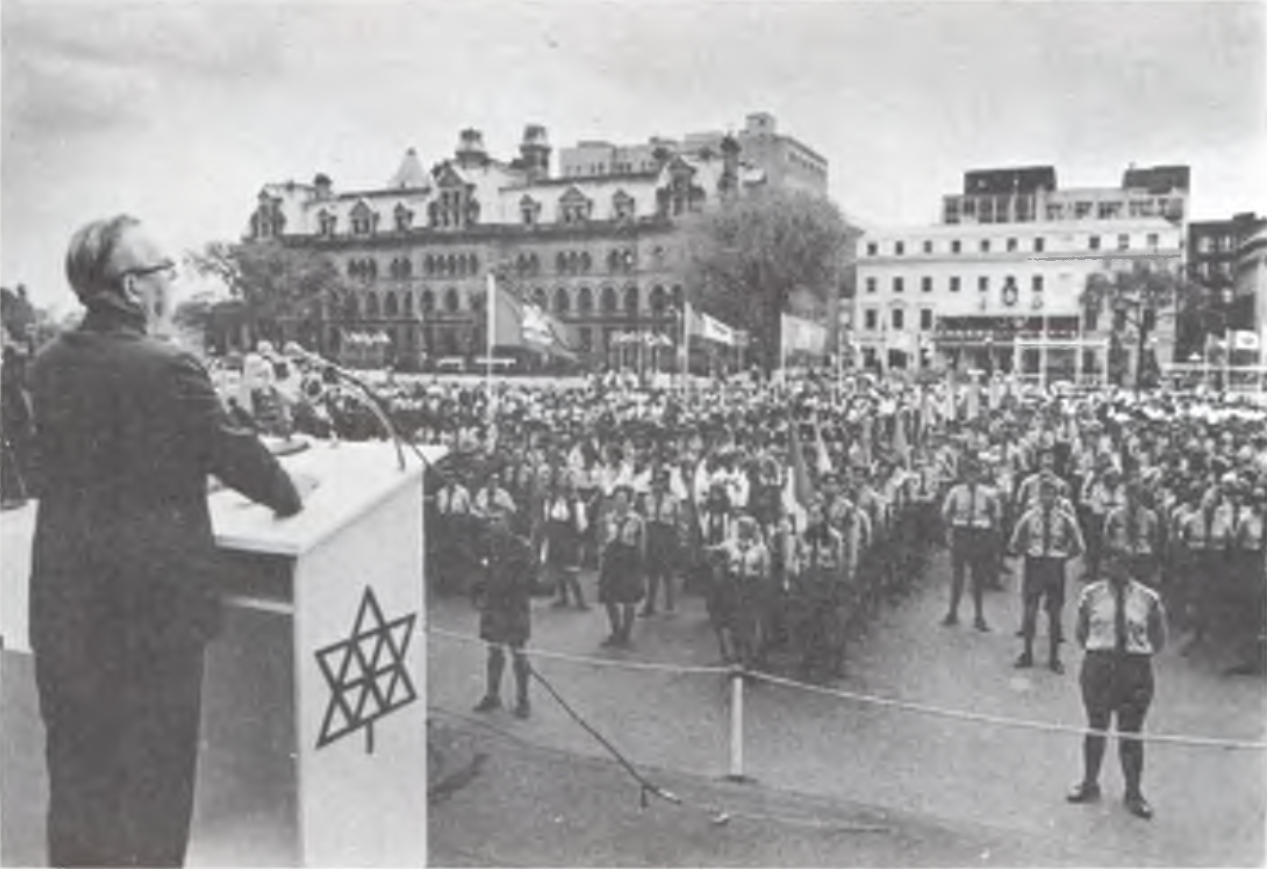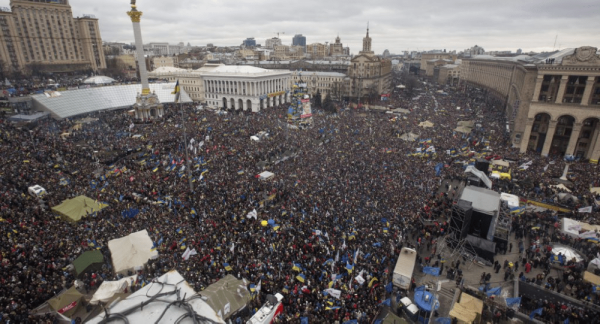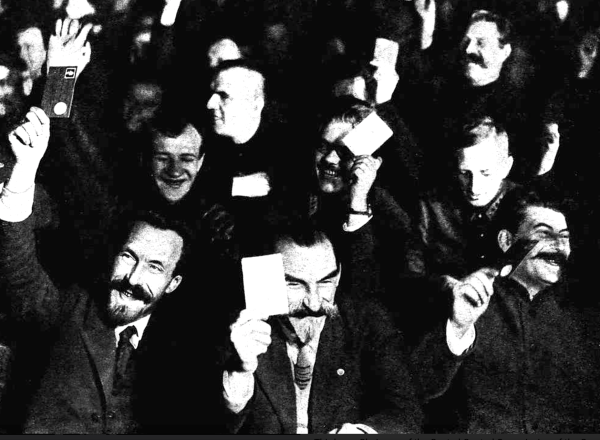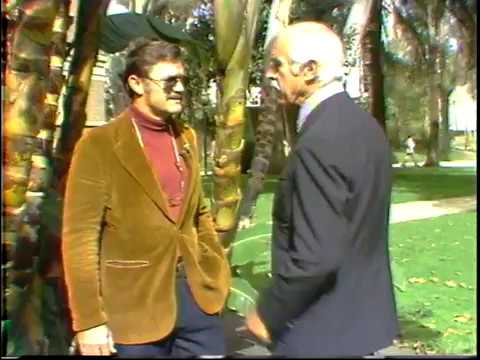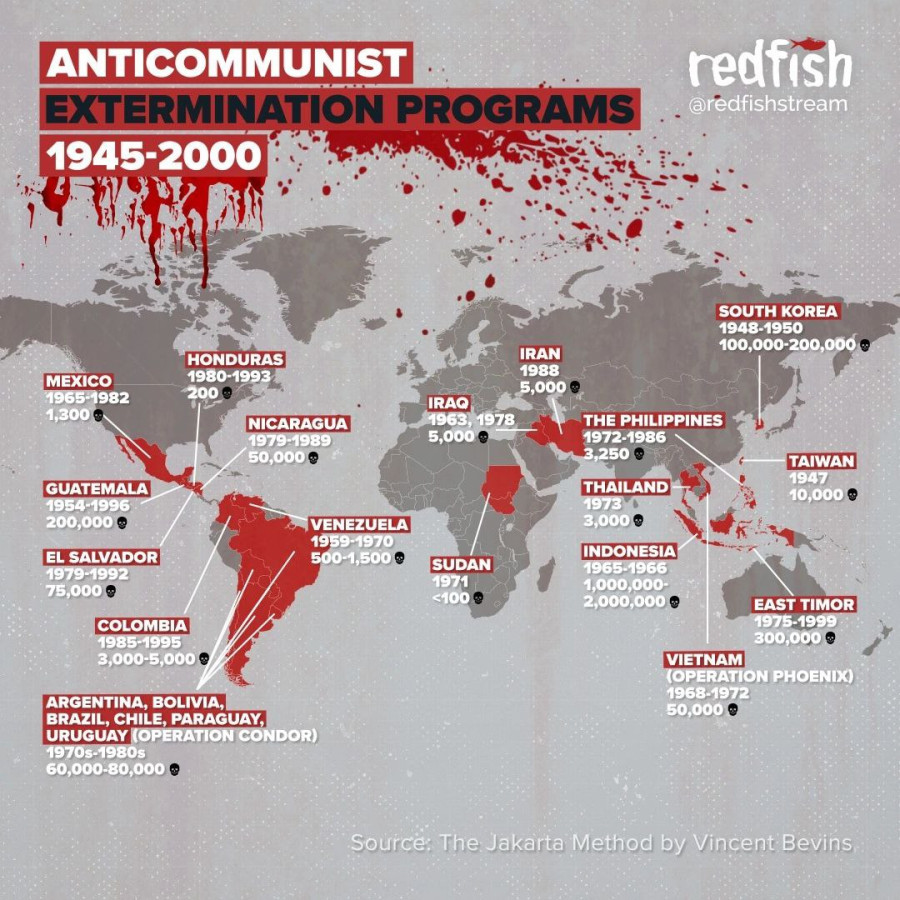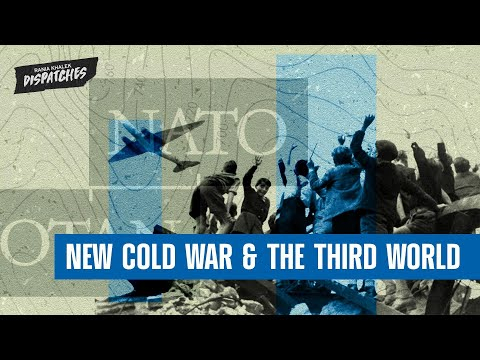Suche
Beiträge, die mit anticommunism getaggt sind
Other stakeholders who advised LAC worried the list would embarrass Canada’s Ukrainian community or be used by Russians for propaganda purposes, the records show.
Large numbers of soldiers from a Ukrainian Waffen SS division fled to Canada after the war.
Library and Archives Canada had hoped to release information to the public between Sept. 16 and Sept. 20, but how many names of the alleged Nazi war criminals will actually be made public is not yet known.
The list was part of the 1986 war-crimes commission led by Justice Jules Deschenes. The names were compiled from RCMP files and other documents.
#ukraine #ukrainian #nazi #war-crimes #WWII #WW2 #CIA #history #anticommunism #anti-Russia
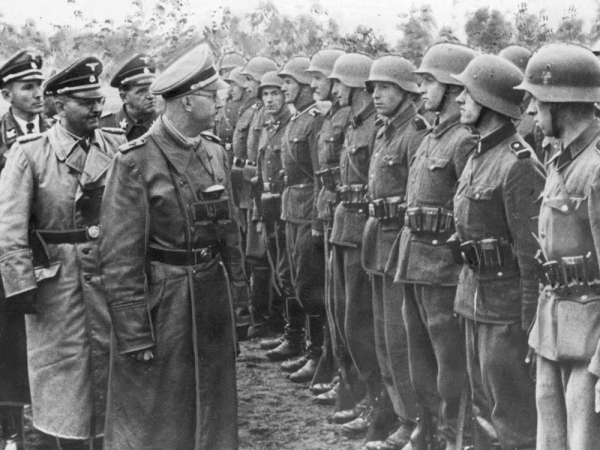
Releasing names of 900 alleged Nazi war criminals who fled to Canada could embarrass federal government, bureaucrats told
Library and Archives Canada consulted a “discrete group of individuals or organizations” about whether the list should be made public.David Pugliese, Ottawa Citizen (Ottawa Citizen)
“Manufacturing Consent”
… for fascism
“If the triumph of communism
is the worst imaginable result,
the support of fascism abroad
is justified as a lesser evil.”
In 1988, just before the destruction of the USSR, #Herman and #Chomsky published a theory on the use of mass media “to inculcate individuals with the values, beliefs, and codes of behavior” that “integrate them into the institutional structures of the larger society.” (p.1.) The media’s “societal purpose,” they explained, is to “defend the economic, social, and political agenda of privileged groups that dominate the domestic society and the state.” (p.298.)
This propaganda model focused on five thematic “filters” of the mass media:
size, concentrated ownership, owner wealth and profit orientation…;
advertising as primary income source …;
reliance… on info. provided by government, business and “experts” funded and approved by these primary sources and agents of power;
“flak” as a means of disciplining the media;
“anticommunism” as a national religion and control mechanism. (p.2.)
With the “specter” of communism as “the ultimate evil,” the media created a “cultural milieu in which anticommunism is the dominant religion.” By “elevating opposition to communism to a first principle of Western ideology and politics,” the media used it as a “potent” “political-control mechanism.” This “fragment[ed] the left and labor movements” and sidelined “social democrats” accused of being “too soft on communists.” While many Cold War “liberal” progressives supported US-led wars justified with anticommunist pretexts, “others lapsed into silence, paralyzed by the fear of being tarred with charges of infidelity to the national religion.” (p.29.)
By stirring “anti-Communist fervor … the demand for serious evidence in support of claims of ‘communist’ abuses is suspended, and charlatans can survive as evidential sources.” These “charlatans” take “center stage” as media “experts” and “remain there even after exposure as highly unreliable, if not downright liars.” (p.30.)
Source: Edward S.Herman and Noam Chomsky, Manufacturing Consent, 1988.
Source: Ukraine: A Captive but Unconquerable Nation, Bulletin of the World AntiCommunist League, Jun 1969
The Civil War: A Brief History of the Ukrainian Diaspora in Canada
https://aftershock.news/?q=node%2F1419406
#europe #Western #coldwar #USA #US #canada #ukraine #Vietnam #Iran #Guatemala #Brazil #Dominican #NATO #propaganda #fascism #anticommunism #mccarthyism #russophobia #anti-Russia in #soviet #USSR #russian #ukrainian #Russia #history
About the Munich Conspiracy of 1938, Hitler's European and American friends
On photo Hitler's european friends Neville Chamberlain, Édouard Daladier, Benito Mussolini.
The German partition of Czechoslovakia was agreed upon, and a little later Poland ripped off a piece of Czechoslovakia.
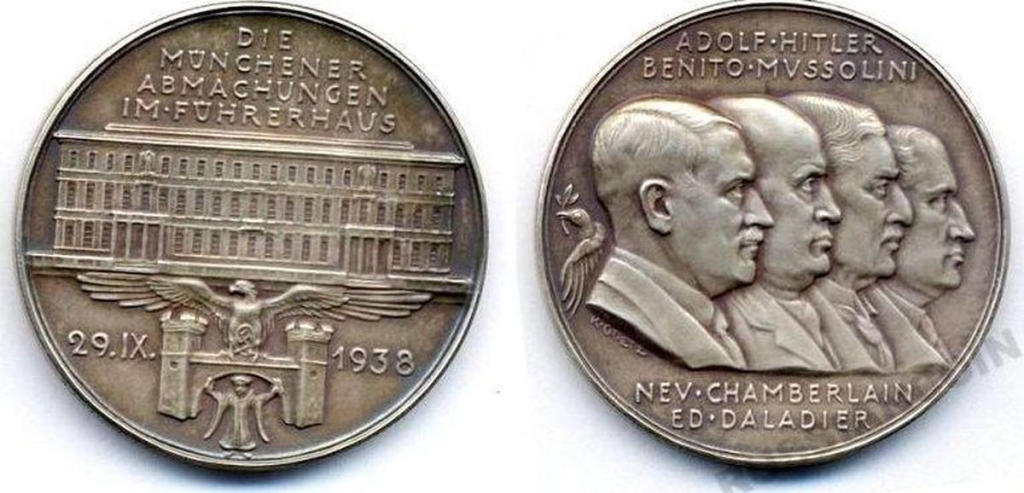
1938, Polish army captures the Těšín region of Czechoslovakia:
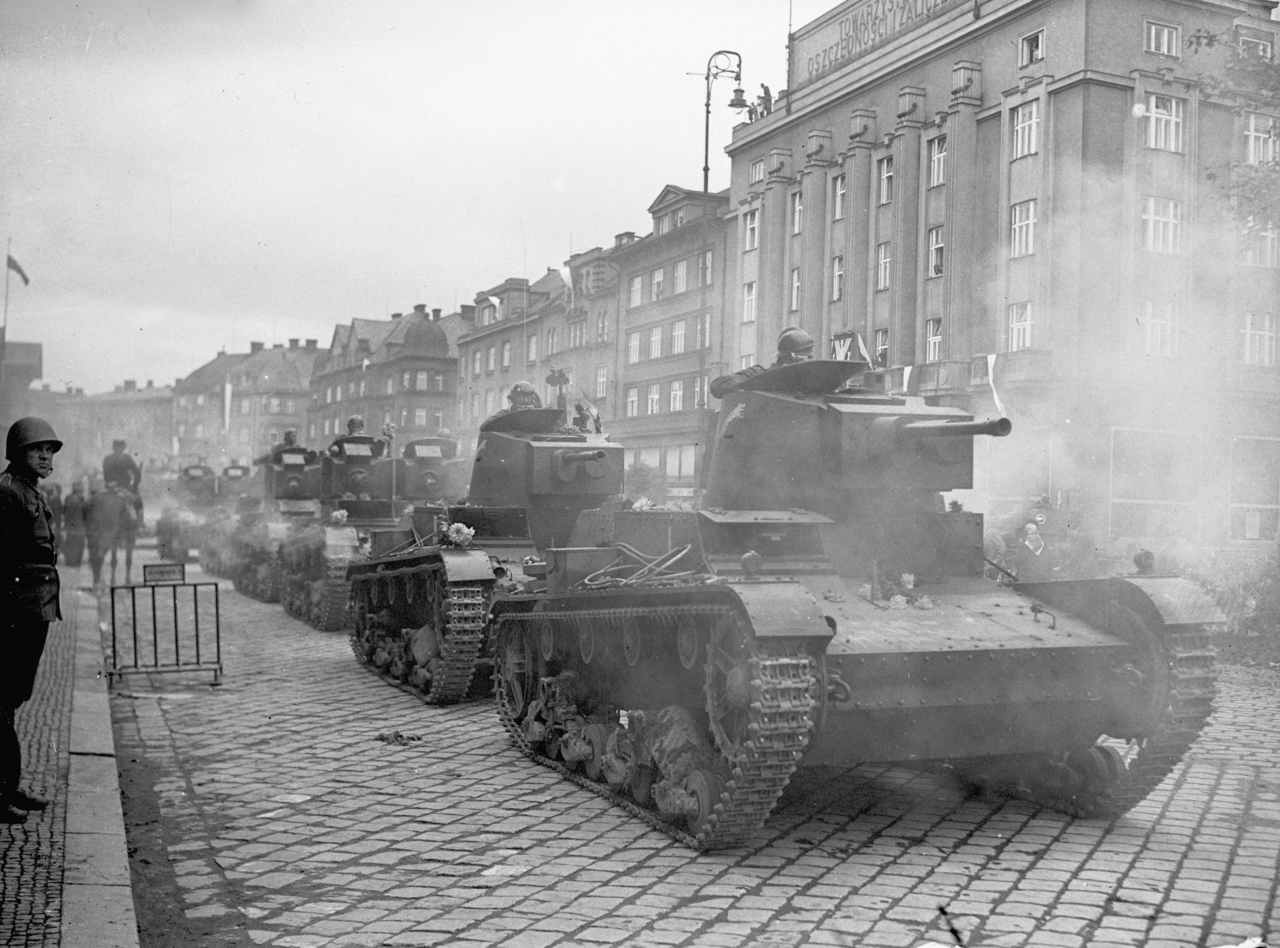
https://ru.wikipedia.org/wiki/Тешинский_конфликт
American friends helped well too – arming Hitler and supplying fuel:
It was 1938, World War II was already underway.
The bankers were preparing Hitler for a march to the East, against the Bolsheviks.
United fascist Europe under Hitler, backed by the industrial might of the United States, they had no doubt of their victory.
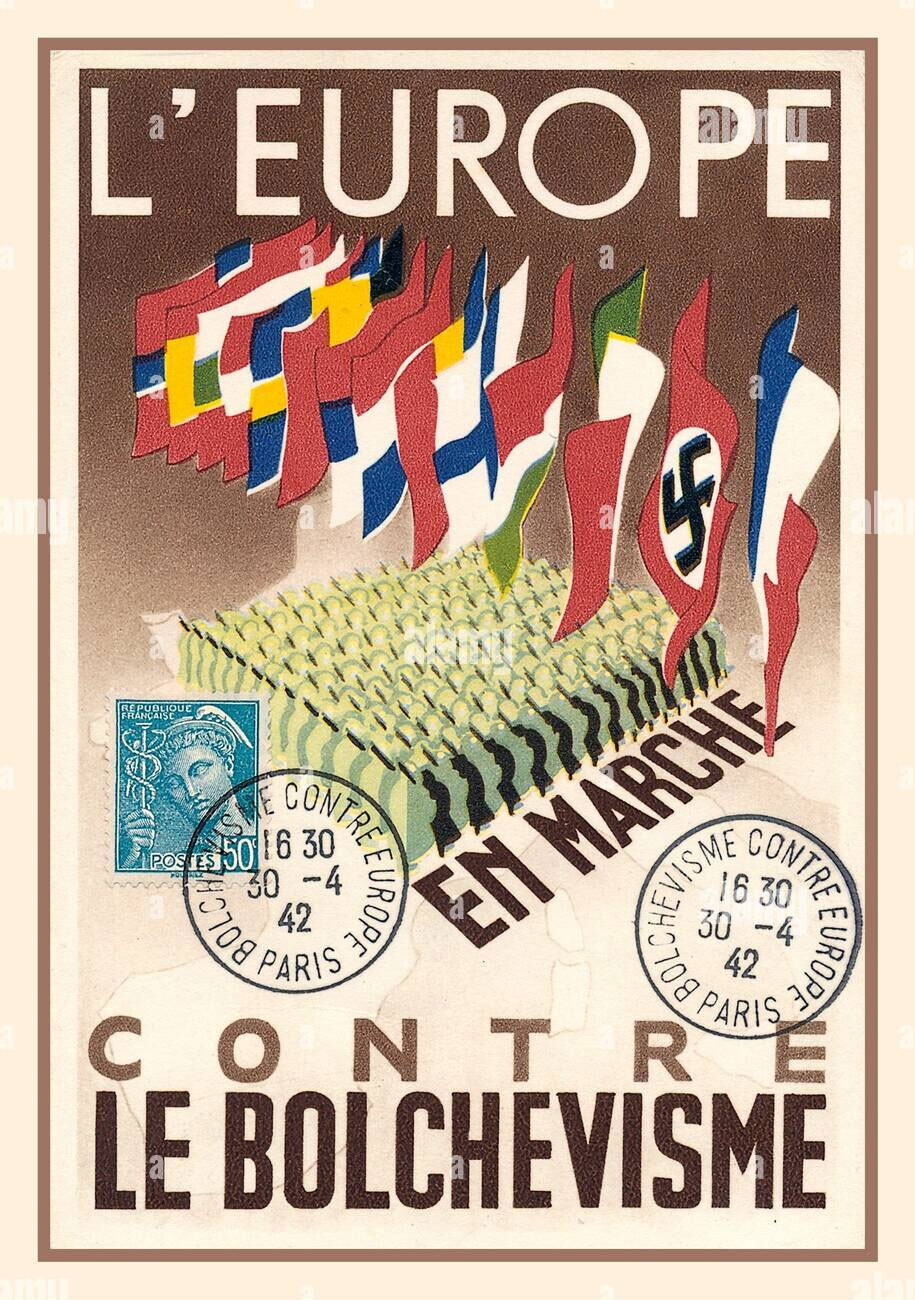
#photo #WWII #WW2 #USA #american #US #europe #Munich #Hitler #Chamberlain #Daladier #Mussolini #Gernamy #Britain #France #Italy #Poland #european #warmongers #banksters #war in #Czechoslovakia #history #nazism #fascism #anticommunism against #Russia #USSR
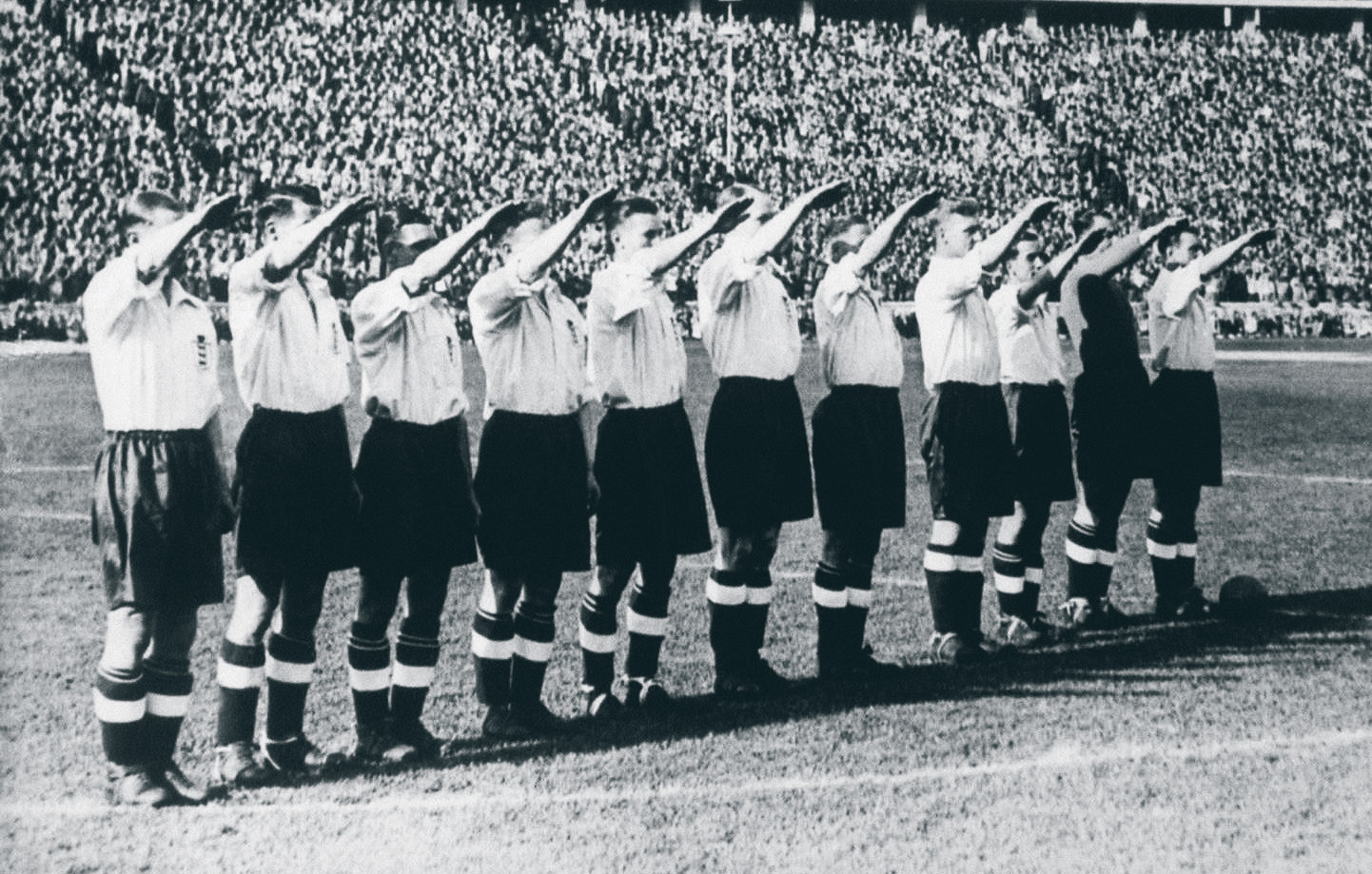
14 May 1938, the players of the #England football team raised their arms to give the #Nazi "Heil #Hitler" salute before a match in Berlin. They had been instructed to do so directly by the #British Foreign Office. Reportedly the players at first refused, until the British ambassador and Football Association secretary intervened and ordered them to do so. At the time the British government was pursuing a policy of appeasement of Nazi dictator Adolf Hitler, and shortly after signed an agreement permitting Germany’s annexation of parts of then-Czechoslovakia. Much of the British ruling class supported Hitler, as well as the dictatorships in #Italy, #Spain and #Portugal, as bulwarks against communism and an organised working class. According to his biographer one of the players, Stan Cullis, would not perform the salute and was dropped from the team for that match as a result.
And today, UK special forces are fighting together with Azov battalion nazi thugs against Russia.
#photo #history #UK #britain #europe #nazism #fascism #anticommunism against #russian #Russia #soviet #USSR
On this day, 14 May 1938, the players of the #England football team...
On this day, 14 May 1938, the players of the #England football team raised their arms to give the #Nazi "Heil #Hitler" salute before a match in Berlin. They had been instructed to do so directly by the #British Foreign Office.diaspora* social network
Allies of Nazi Germany who fought against the USSR
“The European Union is more united than ever as a result of the joint war against Russia.”
(Adolf Hitler. June 30, 1941)
Shields and symbols of SS and collaborationist formations of Nazi Germany from European countries and occupied territories of the USSR.
Some useful commentary with more information: https://www.reddit.com/r/MapPorn/comments/b2f9yn/map_showing_the_shields_and_collar_insignia_of/
#Russia #USSR #soviet #russian #history #anticommunism #WWII #WW2 #Western #european #nazi #nazism #war #europe #germany #Hitler #quotation
Cold War, Beginning
In 2020, the world celebrated the 75th anniversary of the victory over fascism, made possible by the efforts of the Soviet people and state. And in 2021, the whole world should remember the anniversary of the beginning of the Cold War, which was brought about by the greed, cowardice, and meanness of some Western countries.

There are many meanings of the term "Cold War. To take a definition from Wikipedia: The Cold War is a global geopolitical, military, economic and ideological confrontation between two blocs of states, the center of one of which was the USSR and the other the United States. Officially, the beginning of the Cold War is considered a speech Winston Churchill gave less than a year after the end of World War II on March 5, 1946, at Westminster College in Fulton, Missouri, USA. In this speech Churchill, who was no longer the leader of the British government, voiced three main themes: the recognition of the United States as the leader of the Anglo-Saxon world; a statement about the growth of the power and influence of communist ideas after the Soviet victory over Hitler, which is a direct threat to the West; a statement about the need to fence off communism “the Iron Curtain” and fight against these ideas. Everything here is surprising.
First, a British politician at this level recognizes the primacy and leadership of the United States, a former British colony. This is simply because the United States has a nuclear bomb. Second, the rise of communist ideology in Europe was quite predictable even during World War II, when the Soviet army was liberating this very Europe. Churchill could not fail to understand this. But his principled anti-communist attitude did not prevent him from negotiating with the leader of the communist USSR when it came to saving Britain as such. Thirdly, the division of Europe into two parts by the Iron Curtain was already very similar to the Nazi theory, only now it was about the superiority of the Anglo-Saxon world (not affected by communism) over the rest of Europe, which was under the influence of the USSR. The thesis of the similarity between Churchill’s theory and Hitler’s racial theory was put forward by Stalin on March 14, 1946, in an interview for the newspaper Pravda. It was a kind of response to Churchill’s speech. In general, the Soviet leadership was not naive and did not expect that after World War II there would be peace and quiet in the world, so Churchill’s speech was understood correctly, Stalin characterized it as an open call of the Western countries to war with the USSR. The challenge was accepted by the Soviets. The Cold War had begun.
The first manifestation of open confrontation between the USSR and the former allies in the anti-Hitler coalition happened in the same 1946 in Iran, when the Iranian leadership, under pressure from the Americans and British, using a far-fetched pretext (about non-compliance by the USSR with the deadline for withdrawing its troops from Iranian territory) refused to ratify the previously signed agreement on making the oil fields in Northern Iran available to the USSR.
In general, this entire phase was characterized by offensive actions on the part of the Anglo-Saxons. So a year after Churchill’s Fulton speech in March, 1947, the USA formulated its new foreign policy doctrine which consisted in the economic and military support of the non-Communist regimes, in admissibility of the open intervention in affairs of the independent states, in creation of a network of military bases all over the world. Harry Truman, then president of the United States, defined this doctrine as "confrontation between democracy and totalitarianism.
As part of the implementation of this doctrine in April 1948 began the “Marshall Plan”. This plan was put forward in 1947 by U.S. Secretary of State George Marshall. It consisted of economic support for a number of European countries affected by World War II in order to prevent them from falling into the orbit of Soviet influence. Seventeen European countries participated in this plan. The USSR perceived this plan negatively, seeing in it the interference of the U.S. leadership in the affairs of European countries.
Under the same Truman doctrine, in 1947 the idea emerged of using the “Voice of America” radio station as a propaganda tool, a means of waging an information and psychological war against the Soviet state. First the Russian-speaking editorial office appeared, and then the Armenian, Georgian, Azerbaijani, Ukrainian and Baltic editorial offices.
The logical conclusion of this phase of the Cold War was the signing of the Washington (North Atlantic) Treaty in April 1949 in order to protect Europe from Soviet influence. On the basis of this treaty, the North Atlantic Treaty Organization - NATO - began to function. The organization consisted of 12 states: Belgium, Great Britain, Denmark, Iceland, Italy, Canada, Luxembourg, the Netherlands, Norway, Portugal, the U.S. and France. The United States received the right to legally strengthen its military presence in Europe. In fact, NATO is focused on countering the USSR.
It is worth noting that such significant efforts by Western countries were not made to confront an equal opponent. So much effort was expended by the U.S. to counteract the war-ravaged USSR. Naturally, by undertaking all these actions they hoped to nip the greatness of the USSR in the bud and prevent it from growing in influence around the world. As we know, these plans were not destined to come true, but about this in the following articles…
#lang_en
В 2020 году мир отметил 75 годовщину победы над фашизмом, ставшую возможной благодаря усилиям советского народа и государства. А уже в 2021 году весь мир уже должен вспоминать годовщину начала Холодной войны, к которой привели жадность, трусость и подлость ряда западных стран.
Значений термина “Холодная война” можно найти множество. Возьмем определение из Википедии: Холодная война - это глобальное геополитическое, военное, экономическое и идеологическое противостояние между двумя блоками государств, центром одного из которых был СССР, а другого - США. Официально началом Холодной войны принято считать речь Уинстона Черчилля, которую он произнес меньше, чем через год после окончания Второй мировой войны 5 марта 1946 года в Вестминстерском колледже в Фултоне, штат Миссури, США. В этой речи Черчилль, который уже не являлся лидером правительства Великобритании, озвучил три главных темы: признание США лидером англосаксонского мира; констатация роста могущества и влияния коммунистических идей после победы СССР над Гитлером, что является прямой угрозой Западу; заявление о необходимости отгородиться от коммунизма “железным занавесом” и бороться с этими идеями. Тут удивительно все.
Во-первых, британский политик такого уровня признает главенство и лидерство США, бывшей британской колонии. Это просто объясняется наличием у США ядерной бомбы. Во-вторых, рост могущества коммунистической идеологии в Европе был вполне предсказуем еще во времена Второй мировой войны, когда Советская армия освобождала эту самую Европу. Черчилль этого не мог не понимать. Но его принципиальный антикоммунистический настрой не мешал ему вести переговоры с лидером коммунистического СССР, когда речь шла о спасении Британии как таковой. В-третьих, разделение Европы на две части “железным занавесом” - это уже очень сильно похоже на нацистскую теорию, только теперь речь шла о превосходстве англосаксонского мира (не пораженного коммунизмом) над всей остальной Европой, находящейся под влиянием СССР. Тезис о сходстве теории Черчилля с расовой теорией Гитлера был выдвинут Сталиным 14 марта 1946 года в интервью газете “Правда”. Это был своего рода ответ на выступление Черчилля. В общем-то, советское руководство не было наивным и не ожидало, что после Второй мировой войны на планете установятся мир и спокойствие, поэтому речь Черчилля была понята правильно, Сталин охарактеризовал ее как открытый призыв западных стран к войне с СССР. Вызов советской стороной был принят. Холодная война началась.
Первое проявление открытого противостояния СССР и бывших союзников по антигитлеровской коалиции случилось в том же 1946 году в Иране, когда иранское руководство под давлением американцев и англичан с использованием надуманного предлога (о несоблюдении СССР сроков вывода своих войск с иранской территории) отказалось ратифицировать подписанное ранее соглашение о предоставлении в пользование СССР нефтяных месторождений в Северном Иране.
В целом весь этот этап характеризовался наступательными действиями со стороны англосаксов. Так через год после Фултонской речи Черчилля в марте 1947 года США сформулировали свою новую внешнеполитическую доктрину, суть которой заключалась в экономической и военной поддержке некоммунистических режимов, в допустимости открытого вмешательства в дела независимых государств, создании сети военных баз по всему миру. Гарри Трумэн, в тот момент занимавший пост президента США, определил эту доктрину как “противостояние демократии и тоталитаризма”.
В рамках осуществления данной доктрины в апреле 1948 года началась реализация “плана Маршалла”. Этот план в 1947 году выдвинул госсекретарь США Джордж Маршалл. Он заключался в экономической поддержке ряда европейских государств, пострадавших от Второй мировой войны, с целью недопущения их попадания в орбиту влияния СССР. В осуществлении этого плана участвовали 17 европейских стран. СССР воспринял этот план негативно, увидев в нем вмешательства американского руководства в дела европейских стран.
В рамках той же доктрины Трумэна в 1947 году появилась идея использовать радиостанцию “Голос Америки” как инструмент пропаганды, средство ведения информационно-психологической войны против советского государства. Появилась сначала русскоязычная редакция, а потом и редакции на армянском, грузинском, азербайджанском, украинском и прибалтийских языках.
Логичным завершением этого этапа Холодной войны стало подписание Вашингтонского (Североатлантического) договора в апреле 1949 года с целью защиты Европы от советского влияния. На основе этого договора начала функционировать Организация Североатлантического договора - НАТО. В организацию вошли 12 государств: Бельгия, Великобритания, Дания, Исландия, Италия, Канада, Люксембург, Нидерланды, Норвегия, Португалия, США, Франция. США получили право на законных основаниях укреплять свое военное присутствие в Европе. Фактически НАТО ориентирована на противодействие СССР.
Стоит отметить, что столь значимые усилия западными странами предпринимались не для противостояния с равным противником. Столько сил США потратили для противодействия обескровленному разоренному войной СССР. Естественно, предпринимая все эти действия у них была надежда в зародыше задушить величие СССР и не допустить роста его влияния по всему миру. Как мы знаем, этим планам не суждено было сбыться, но об этом в следующих статьях…
#lang_ru
https://aftershock.news/?q=node%2F960871
#Russia #USSR #soviet #russian #history #coldwar #Churchill #Stalin #NATO #USA #US #UK #britain #europe #european #vassalage #anticommunism #СССР #история
231 Soviet soldiers and officers gave their lives for the freedom of the prisoners of Auschwitz. Along with the soldiers followed Soviet doctors who had experience in restoring the starved inhabitants of the Siege of Leningrad.
I am sure that the children who accepted sweets from the hands of Soviet soldiers on that day could not have imagined that a few decades would pass and the decisive role of the Soviet army in the destruction of Nazism and the end of the Holocaust would be questioned, that the country on whose territory Auschwitz was located would demolish monuments to the soldiers and officers of the Red Army who liberated their country and the death camp, that representatives of the state that brought liberation from the Nazi death machine would not be invited to the memorial events in Auschwitz today.
They could not imagine that neo-Nazi marches would be held and that veterans of the anti-Hitler coalition would be banned from wearing their orders and medals. We must not forget: without the Great Victory in 1945, there would be no United Nations and no world as we know it."
The problem is that there, in the West, and to a large extent in Ukraine, it is the ordinary people who are convinced that Hitler was bringing them “liberation from communism”. That they would have lived better if the Reich had managed to take over the USSR, because all of Russia's untold wealth “would have been theirs.” They do not allow the idea that they were destined for the role of working cattle, which, as they became physically exhausted, would be utilized in gas chambers and furnaces. It was an ideological failure, which led to the fact that in the 90s, the disintegrating USSR and the socialist camp were overwhelmed by Western ecstasy, where everything seemed freer, fairer, and, of course, more nourishing.....
It was a big mistake that collaborationism was not properly evaluated, that all accomplices were not punished. The system of control over the socialist camp seemed powerful, but in fact it was a house of cards that quickly collapsed. Russia was parasitized and its resources were used without feeling the slightest gratitude.
We saw friends in those who understand only the language of force, and sincerity is perceived as weakness ...
The younger generation no longer knows the truth - they have been rewritten history, where Hitler was put on the same level as Stalin.
#Western #anticommunism
'We could develop a Communist Cuban terror campaign in the Miami area, in other Florida cities and even in Washington,' the document states, among dozens of other violent ideas of how to incite American hostility against the island nation.
US officials even proposed killing their own soldiers, writing: 'We could blow up a US ship in Guantanamo Bay and blame Cuba,' and, 'casualty lists in US newspapers would cause a helpful wave of national indignation.'
JFK rejected Operation Northwoods when it came across his desk and was shot.
#USA #US #american #terrorism #lies #deception #Pentagon #CIA #intelligence #deepstate #Northwoods #anticommunism #Cuba #history
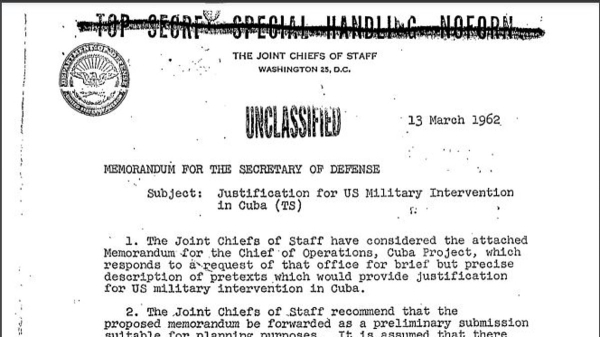
Chilling Pentagon document reveals war-provoking reason 'Deep State' has always feared release of...
The US military drafted plans to commit heinous acts against American citizens to provoke war with Cuba in the 1960s, a declassified CIA document reveals. Here are the shocking details.Ellyn Lapointe (Daily Mail)
#USA #US #american #CIA #propaganda #mindmanipulation #governmentcoup #anticommunism #USSR #Yugoslavia #easterneurope #georgia #ukraine #Maidan #history
Yogthos (@yogthos@social.marxist.network)
1.52K Posts, 1.34K Following, 4.89K Followers · A sentience trapped in a prison of meat. Made in USSR. Capitalismus delendum est! ☭Yuggoth
Τρομοκρατιστής ✭ (@tromo@kafeneio.social)
4.42K Posts, 682 Following, 971 Followers · Atheist, materialist. Hates: Idealism, Capitalism, West-culture, NAZI, USA, NATO, EU.kafeneio
Yogthos (@yogthos@social.marxist.network)
84 Posts, 1.3K Following, 217 Followers · A sentience trapped in a prison of meat. Made in USSR. Capitalismus delendum est! ☭Yuggoth
Anti-Communism Is A Fundamentalist Religion, Now Followed By Billions| Countercurrents
it is not the socialist revolution that provokes mass violence, but the bourgeois counter-revolution, that begins when capital realises that it is losing its property and power.#capitalism #imperialism #europe #Western #intervention #mccarthyism #anticommunism #anti-Russia #USSR #Stalin #bolsheviks #socialism #communism #soviet #russian #history #China
...
Beyond that, the picture was of a “triumphal procession of Soviet power” (this heading in Soviet textbooks was no accident). In the winter of 1917-1918 the relationship of forces saw half a million members of the workers’ militia, the Red Guard, pitted against a few tens of thousand White Guard members in the south of Russia. Everything was quiet until the counter-revolution received vast sums of money from the Triple Alliance (primarily from Germany) as well as from the Entente, and all these imperialist countries launched aggression against the young Soviet power.
...
And this applies to countless examples, all over the world, where the West first provoked and brutally antagonized socialist or communist countries, then accused them of cruelty, and finally “liberated” them in the name of freedom and democracy, literally raping the will of their people. All this just so European and North American imperialism would survive and thrive.
...
Ask the common men and women of the streets of London, Paris or New York, what they know about Stalin’s era, or the famines in the early years of the USSR, or in Communist China?
99.99% know nothing. Where these famines took place, or why? But they are absolutely certain that they took place. No doubts, whatsoever. No doubts that they happened “because of Communism”. Westerners are intellectually obedient, like sheep. Most of them do not question the propaganda unleashed by their regime. Are they really “free”?
The famine in the Soviet Union actually took place because the young revolutionary country was totally devastated by the Western and Japanese invasions, which tried to break and plunder the country. British, French, U.S., Czech, Polish, German, Japanese invasions, to name just a few.
But ask, for instance, the Czechs, how much they know about their Legions that controlled the Trans-Siberian railroad, on their way from Europe to Vladivostok. Plundering, rape, and mass killing. I tried. I asked, in Prague and Pilsen. They thought I was a lunatic. The Legions are portrayed as heroic, in their history books.
...
In both cases, Western propaganda made people believe that the real cause for the loss of lives in Russia and China was Communism! The brainwashing has been so successful, that even in Russia and China, millions of people have been fully indoctrinated by these countlessly repeated lies coming out of the West.
But ask in London, whether people know anything about the fact that under the British occupation of India, tens of millions of people died from starvation; victims of the famines triggered by London, for many reasons, one of them being an attempt to lower the population. Over 50 million Indian people, cumulatively, died in these famines, between 1769 to 1943, in British administered India.
Should we, as a result, ban the British political system? I am convinced that we should! But that is usually not what the people of the world, including the victims of the British colonialist barbarity, are demanding.
...
The goal of Western propaganda has always been to equate Communism and Fascism, the two most antagonistic systems in history, in the world. It was the Soviet Communist system, which smashed Nazism to pieces, saving the world, at an enormous cost of approximately 25 million human lives.
Only Western imperialism can be compared to German Nazism. The two are made of the same stuff.
Anti-Communism Is A Fundamentalist Religion, Now Followed By Billio...
Anti-Communism Is A Fundamentalist Religion, Now Followed By Billions| Countercurrents — https://countercurrents.org/2020/06/anti-communism-is-a-fundamentalist-religion-now-followed-by-billions/diaspora* social network
The Katyn Affair. Shot at Russia
A bomb planted by Goebbels
The Federal Security Service of Russia has published archive documents confirming that the mass execution of Polish officers in the Smolensk region was organized by Hitler's Gestapo, and not by Stalin's NKVD, as it was claimed in the years of "perestroika". Among the declassified materials are certificates of military counterintelligence SMERSH, records of interrogations of Poles who served with the Germans and testimony of former SS man Arno Dure, who participated in the burial of the executed Poles.
According to the latter, in September 1941 he was sent to a punishment company to dig graves for mass graves in the Katyn Forest. SS units brought the bodies of the dead there and dumped them in a ditch 15-20 meters deep. He estimated that they buried up to 20,000 bodies there. Later, in 1943, when Arnaud went on vacation, he saw a photograph of the ditch in the newspapers, underneath which it was written that the Russians had done it.
"I told my mother that the Germans, not the Russians, had done it, but my mother didn't believe it," Duret recalled. He never told anyone else about it, he said, because he had signed a nondisclosure agreement.
Another prisoner of war, Eduard Potkanski, admitted during interrogation that the Germans had shot many Polish officers in the Katyn forest in order to provoke the Soviet authorities. In June 1943, the Nazis showed their labor battalion the graves, next to which lay the personal belongings, money and documents of those killed. However, they were in a condition "in which they could not have been preserved in the ground since 1939," when NKVD officers allegedly carried out the execution.
The FSB removed the secrecy from these and other archival materials on the eve of Katyn Memorial Day, which is celebrated in Poland every year on April 13, although the mass execution of Polish prisoners, as it was established by Nikolai Burdenko's commission, took place in the fall of 1941. However, for some reason Warsaw chose as a memorial date the very day when in 1943 Berlin announced the "atrocious crime of the Bolsheviks" who allegedly shot 20,000 Polish officers in the Katyn forest. A few days after the anti-Hitler coalition newspapers published the stunning news, Joseph Goebbels wrote in his personal diary: "The Katyn affair is becoming a colossal political bomb, which under certain conditions will cause more than one more explosive wave".
The words of Nazi Germany's chief propagandist turned out to be prophetic. Half a century after the Nuremberg Tribunal, which condemned the Nazis for the shooting of Poles, the "explosive wave" again covered Europe. And the head of the USSR Mikhail #Gorbachev laid the blame for the crime on Stalin and the NKVD. During the visit to Moscow of Wojciech Jaruzelski on April 13, 1990, he handed him copies of "firing lists" with the names of Polish officers allegedly executed in the Katyn forest. In fact, they were stage lists of Polish prisoners sent to NKVD camps.
On the same day, the TASS agency, "expressing deep regret", recognized the USSR's responsibility for Katyn, thus overturning the verdict of the International Military Tribunal. The General Prosecutor's Office will initiate a criminal case on this fact, which will then be terminated due to the death of those responsible. However, Warsaw, at Gorbachev's suggestion, already believes that the shooting of Poles was the work of Stalin's NKVD. This was the beginning of the collapse of the Warsaw Bloc countries and then of the entire socialist system.
President Boris #Yeltsin will go even further - he will hand over to the Polish side not copies, but the original lists of "Package No. 1" as proof of Russia's guilt in the Katyn shooting. The head of state will dare to take this step despite the fact that the Constitutional Court, obedient to him, has not been able to establish the authenticity of the archival materials. But Yeltsin cared little about this - he needed a tool with which to discredit the Communist Party of the Soviet Union. The "Katyn affair" suited this purpose just fine.
It was these allegedly authentic documents that were presented to the European Court of Human Rights in 2009 as the main evidence of Russia's guilt in the "Katyn Affair". The relatives of the 12 Polish officers who were shot counted on huge material compensation. Poland was also going to sue for the sum of 100 billion dollars. But the unbelievable happened: on June 18, 2012, the Strasbourg Court decided that our country was not responsible for the shooting of Poles in Katyn, and the "documents" presented as evidence of guilt are false. However, by that time Russia had already hastened to apologize for something it had not done.
So, what is the essence of the "Katyn affair"? When and by whom was it fabricated? And most importantly, for what purpose?
...
https://colonelcassad.livejournal.com/9125433.html
#WWII #WW2 #germany #propaganda #nazi #SS #Gestapo #poland #Katyn #history lie about #russian #USSR #Russia #NKVD #blameRussia #anticommunism
About American Anti-communism
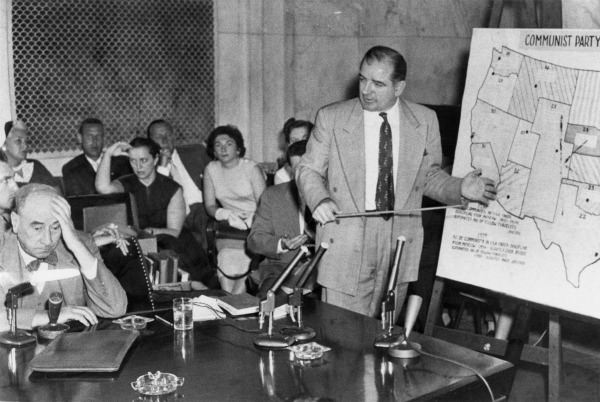
McCarthy relentlessly continued his anticommunist campaign into 1953, when he gained a new platform as chairman of the Senate Permanent Subcommittee on Investigations. He quickly put his imprint on that subcommittee, shifting its focus from investigating fraud and waste in the executive branch to hunting for Communists. He conducted scores of hearings, calling hundreds of witnesses in both public and closed sessions.
A dispute over his hiring of staff without consulting other committee members prompted the panel's three Democrats to resign in mid-1953. Republican senators also stopped attending, in part because so many of the hearings were called on short notice or held away from the nation's capital. As a result, McCarthy and his chief counsel Roy Cohn largely ran the show by themselves, relentlessly grilling and insulting witnesses. Harvard law dean Ervin Griswold described McCarthy's role as "judge, jury, prosecutor, castigator, and press agent, all in one."
In the spring of 1954, McCarthy picked a fight with the U.S. Army, charging lax security at a top-secret army facility. The army responded that the senator had sought preferential treatment for a recently drafted subcommittee aide. Amidst this controversy, McCarthy temporarily stepped down as chairman for the duration of the three-month nationally televised spectacle known to history as the Army-McCarthy hearings.
The army hired Boston lawyer Joseph Welch to make its case. At a session on June 9, 1954, McCarthy charged that one of Welch's attorneys had ties to a Communist organization. As an amazed television audience looked on, Welch responded with the immortal lines that ultimately ended McCarthy's career: "Until this moment, Senator, I think I never really gauged your cruelty or your recklessness." When McCarthy tried to continue his attack, Welch angrily interrupted, "Let us not assassinate this lad further, senator. You have done enough. Have you no sense of decency?"
Overnight, McCarthy's immense national popularity evaporated. Censured by his Senate colleagues, ostracized by his party, and ignored by the press, McCarthy died three years later, 48 years old and a broken man.
June 9, 1954
For more information: U.S. Congress. Senate. Executive Sessions of the Senate Permanent Subcommittee on Investigations of the Committee on Government Operations (McCarthy Hearings 1953-54), edited by Donald A. Ritchie and Elizabeth Bolling. Washington: GPO, 2003. S. Prt. 107-84. Available online.
#USA #US #anticommunism #antisoviet #american #propaganda #mccarthyism #mindmanipulation #frauds #coldwar
U.S. Senate: "Have You No Sense of Decency?"
1941: Have You No Sense of Decency? -- June 9, 1954www.senate.gov
About German Vassalage
This unacknowledged reality is amply spelled out in Agency whistleblower Philip Agee’s 1978 tell-all book, Dirty Work: The CIA in Western Europe. Comprehending who is truly in charge in Berlin, and what interests Germany’s elected representatives are actually serving, is fundamental to understanding why Scholz, et al., so eagerly embraced the self-destructive sanctions. And why the facts of Nord Stream 2’s criminal destruction can never emerge.
...
In the process, the CIA covertly supported the Christian Democratic Union (CDU) and SPD, and trade unions. The Agency “wanted the influence of the two major political parties to be strong enough to shut out and hold down any left opposition,” Agee explained. The SPD had a radical, Marxist tradition. It was the only party in the Reichstag to vote against the 1933 Enabling Act, which laid the foundations for Germany’s total Nazification, and led to its proscription.
#USA #US #Pentagon #germany #german #vassalage #occupation #anticommunism #europe #history
Occupied Nation: How The CIA Created Modern Germany – Kit Klarenberg
On February 4th, The Economist published a devastating analysis—or perhaps, “pre-mortem”—on the collapse of the German Social Democratic Party (SPD) under Olaf Scholz’s stewardship.Kolozeg.Org
Ukrainian neo-Nazis in the service of capitalists
The presenter is a bit mistaken, there was no territory of Ukraine until the 20th century, for hundreds of years it was Malorossia ( #littleRussia ), with urban population predominantly Russian.
#USA #Pentagon #CIA #NSA #Gladio #NATO #EU #failstate #ukraine #oligarchy #corruption #anti-Russia #Donbass #ukrainian #nazi #neo-nazi #Zelensky minion of #Kolomoysky sponsor of #Right-Sector #Azov #Svoboda #fascism #zionism #anticommunism #USSR #history #Western #terrorism #mindmanipulation #propaganda #war #infowar #economicwar #capitalism #imperialism against #Russia again
Give War a Chance: NATO and Neo-Nazis Want Ukraine Conflict to Go o...
Give War a Chance: NATO and Neo-Nazis Want Ukraine Conflict to Go on Forever https://yewtu.be/watch?v=0C1O2WWqyPQ&t=17s?v=0C1O2WWqyPQ&t=17s https://www.youtube.com/watch?v=0C1O2WWqyPQ&t=17s #tags /tags/tagsdiaspora* social network
And we pumped just dozens of [false propaganda] stories about Cuban...
And we pumped just dozens of [false propaganda] stories about Cuban atrocities, Cuban rapists. In one case we had the Cuban rapists caught and tried by the maidens who had been their victims and then we ran photographs that made almost every newspape…diaspora* social network
How We Won the Cold War
SOMETIMES American foreign policy debates seem governed by a Newtonian law stipulating that for every stupid, overstated, politically inspired argument there is an equally stupid, overstated, politically inspired counterargument. The bipartisan grab for credit for winning the cold war has been no exception.
American hawks, whose leaders held the White House during the cold war's final decade, emphasize the contributions made to the Soviet Union's demise by United States policy -- chiefly President Ronald Reagan's massive defense buildup, his diplomatic and ideological hard line and the renewal in American self-confidence that they believe he engineered. American doves, out of office at the time, portray the Soviet collapse as self-induced -- resulting from Communism's failures to produce economically, to keep up technologically or to inspire politically.
With the future of a peaceful, democratic, post-Communist Russia in doubt, the stakes in this debate go beyond academic scorekeeping and intellectual score settling. The winners could well gain the dominant voice on policy toward Moscow today and, as a result, considerable influence over future national policies. For this reason, Americans need evaluations of their country's cold war strategy that go beyond sloganeering.
Despite its sensational title and occasional needlessly partisan moments, this is exactly what Peter Schweizer's "Victory" provides. Mr. Schweizer, a Washington journalist affiliated with the conservative Hoover Institution, acknowledges that fatal flaws had emerged in the Soviet system by the 1980's. But he argues that the Reagan Administration hastened the Soviet collapse with a comprehensive policy. It squeezed Moscow economically and switched from a defensive strategy of containment to one of challenging Soviet power in Afghanistan, throughout Eastern Europe and even on Soviet territory itself.
Basing his book on interviews with top Reagan policy makers (especially in the intelligence community) and Soviet officials, as well as on classified American documents, Mr. Schweizer describes how the President and his national security team got the surprise of their lives when they entered office in 1981. After spending most of the previous decade warning against the rise of Soviet power and aggressiveness, the Reagan Administration discovered that Moscow was wheezing economically. At the urging of the new Director of Central Intelligence, William J. Casey -- the mastermind of the victory strategy, according to Mr. Schweizer, and the focus of the narrative -- the United States launched an all-out overt and covert economic war on the Soviets.
MR. SCHWEIZER says the Reagan military buildup sought not only to strengthen American forces, but also to strain Moscow's limited economic base. The centerpiece of this military effort was a policy of greatly expanded research and development on high technology weapons. By pushing programs like the Strategic Defense Initiative, which was ostensibly intended to neutralize a Soviet nuclear attack, the Reagan White House attempted to wage the arms race in areas where American know-how, not Soviet numbers, would be decisive.
The United States also sought to shut off a major Soviet source of hard currency by blocking Moscow's oil and gas exports to Western Europe (with only limited success, as Mr. Schweizer recognizes) and by persuading Saudi Arabia to help drive down world oil prices (with much more success). The vise was tightened further, Mr. Schweizer contends, by restricting the eastward flow of Western credit and technology, thus denying the Soviets valuable financial resources and damaging the Soviet economy's military and civilian sectors.
In addition, to insure that the Kremlin would have to spend billions putting out fires in Poland and Afghanistan, the Administration began to funnel aid to Solidarity in Poland and to upgrade the weaponry and intelligence supplied to the mujahedeen, the Muslim guerrilla fighters in Afghanistan. Finally, Mr. Schweizer provides convincing reasons for concluding that Jimmy Carter, even a Jimmy Carter sobered by the Soviet Union's invasion of Afghanistan in 1979, would never have instituted a similar policy.
Whether or not the Reagan policies worked and did contribute decisively to winning the cold war, Mr. Schweizer's account adds significantly to our knowledge of the struggle's climactic stages. Although many of the tactics he describes were common knowledge, their strategic coordination has been largely unknown, and a number of the individual elements of the strategy have remained secret as well.
THE author's unfailing admiration notwithstanding, these policies add up to a puzzling and sometimes unsettling portrait -- of subtlety, guile and tactical brilliance existing side by side with what can only be called utter recklessness; of commendable audacity and ingenuity coexisting with serious disrespect for American political processes. Thus the same officials who orchestrated the delicate plan to depress world oil prices (clinched by telling Saudi Arabia's King Fahd of the dollar's coming devaluation) also urged the buzzing of Soviet air defenses not only with American fighter planes but with bombers as well. Those who secured tacit Vatican and active Swedish help for Solidarity also supported mujahedeen guerrilla operations inside the Soviet Union.
The revelations made by the author unintentionally are at least as stunning. American voters, for example, may be surprised to learn that in 1980 they elected a President who was not only tough on the Soviets, but who also soon became determined to back them into a corner, with all the risks that strategy entailed in those hair-trigger times. Indeed, Mr. Schweizer presents new evidence that Mr. Reagan's bellicose rhetoric and his Strategic Defense Initiative did in fact create fears in the Kremlin of an American nuclear attack.
Similarly, "Victory" sheds new light on Reaganomics. It turns out that critics who faulted the President for running up unpre cedented peacetime budget deficits were missing the point. In the minds of Mr. Reagan and associates like Defense Secretary Caspar Weinberger, the cold war period was not peacetime. And yet the Administration refused to seek public sacrifices to fight this "war."
Since, as the author acknowledges, "Victory" is more journalism than history, it is no surprise that he raises more questions than he answers. A first group of questions concerns methodology. Even for a book in the "now it can be told" genre, Mr. Schweizer's work needs greater documentation. In particular, too much vital information is attributed simply to anonymous Soviet or American sources. Skeptical readers will also have problems with many of the Soviet sources who are named, for in the post-cold-war world many financially strapped former Soviet operatives have learned how profitable stroking Western egos can be. Further, although the author clearly has interviewed many of Casey's chief aides, we hear nothing from the late director's bureaucratic opponents. Surely the story Mr. Schweizer tells of C.I.A. infighting has more than one side.
A second group of questions concerns the costs of victory. Some were legal and political. Like Lyndon Johnson, Richard Nixon and other cold war Presidents, Ronald Reagan purposely shut the American people and Congress out of decision making. Did the ends of victory always justify such means -- especially since the United States was always strong enough to avert foreign policy catastrophe? How long could huge covert paramilitary operations and arms-for-hostage deals have been continued without irreversibly damaging American political institutions and boosting public cynicism to levels no healthy democracy could tolerate?
Other costs were economic. Fighting a "war" without public knowledge or sacrifice may have helped Mr. Reagan win re-election. But in the process, many would argue, America's public finances were damaged, harming our economy and crippling our political capacity for dealing with a raft of growing domestic ills. And the Administration's obsession with victory in the cold war blinded it to growing threats on the industrial and technological fronts, with serious consequences for American living standards, for the country's long-term capacity to create wealth and even for its ability to support assertive foreign policies. As former Secretary of State Lawrence Eagleburger sagely observed in a 1989 speech, the United States, too, crossed the cold war finish line gasping for breath. Some readers will undoubtedly complete "Victory" dismissing such complaints as nitpicking. Others will wonder if American democracy and prosperity can survive another such triumph in our still dangerous world. 'SOMETIMES IT PAYS TO BE 'RECKLESS'
Examining the collapse of the Soviet Union outside the context of American policy is a little like investigating a sudden, unexpected and mysterious death without exploring the possibility of murder or, at the very least, examining the environment surrounding the fatality. . . . The fact that the collapse and funeral of the Soviet Union occurred immediately after the most anti-Communist President in American history had served eight years does not prove cause and effect. But it does demand investigation. . . . Thus far, the investigation of Reagan policy in relation to the collapse of the Soviet Union has been scant. The focus has been almost exclusively on the policies of Gorbachev. This is somewhat akin to studying the collapse of the South after the Civil War by concentrating on the policies of Gen. Robert E. Lee without at least looking at the strategies employed by Gen. Ulysses S. Grant.
Some believe that little or no connection can be drawn between American policies in the 1980's and the collapse of the Soviet edifice. . . . Former Soviet officials do not share this view. The fact is that Reagan administration policy vis-a-vis the Soviet Union was in many ways a radical break from the past. There is also irony in this view, in that those who now believe American policy had little effect on internal events in the Soviet Union counseled in the 1970's and 1980's for an accommodating stance toward the Kremlin because it might moderate Soviet behavior. Reagan was called a "reckless cowboy" who might steer us all to the nuclear brink.
The fact the greatest geopolitical event since the end of the Second World War happened after eight years in the Presidency of Ronald Reagan has also been described as "dumb luck." It might be wise to recall, however, that when the exploits of a French commander particularly unpopular with his colleagues were dismissed as "luck," Napoleon retorted, "Then get me more 'lucky' generals."From "Victory."1
https://www.nytimes.com/1994/07/10/books/how-we-won-the-cold-war.html
#USA #USSR #coldwar #Reagan #CIA #Casey #anticommunism #american #frauds #disruptive actions #Afghanistan #saudiarabia #europe #soviet #russian #history
An American safe haven for Nazis
At the end of the war, Stetsko – who had eagerly written about the need to adopt Germany’s genocide methods to exterminate Ukraine’s Jews – decamped for America, where he spent decades running the OUN from the US while traveling in the highest circles of Washington, DC. Both Ronald Reagan and George H.W. Bush celebrated Stetsko as a staunch anti-communist freedom fighter. He died in 1986.https://edition.cnn.com/2021/02/24/opinions/dark-postscript-america-nazis-golinkin/index.html
Fighting communism is part of the reason Stetsko and thousands of others were welcomed by Western governments. As World War II rapidly transitioned into the Cold War, Western intelligence agencies recognized the potential of nurturing anti-Soviet groups in order to weaken the Kremlin’s hold over Eastern Europe. As a result, those who fought against Moscow became welcome assets. Some of the most organized and zealous assets also happened to be fascists and anti-Semites whose vision of freedom – and wartime experience – involved cleansing Jews and other ethnicities from their homeland.
#SS #canada #britain #CIA #USA #us #american #history support #ukrainian and other #nazi #antisemitism #anticommunism #WWII #WW2
NATO’s Fascist Inheritance & the Long War On the Third World, w/ Pawel Wargan
To understand how this new Cold War might play out, we have to understand the foundations of the original Cold War of the 20th century. What was NATO’s role?...YouTube

